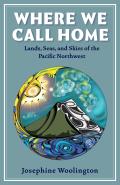2024 Winner of the Oregon Book Award for General Nonfiction
 by Josephine Woolington
by Josephine Woolington
Reconnect with the natural world through essays that blend science and prose. In her debut work, Josephine Woolington turns back the clock to review the events that have challenged Pacific Northwest wildlife in an effort to provide a deeper sense of place. Only then can we imagine how these imperious effects might be overcome.
Join Woolington as she sheds light on the diverse species whose populations are slowly declining from the lands, seas, and skies of the Pacific Northwest. Only by acknowledging this truth can we understand that our impact on the Earth is deeper and far more significant than we ever imagined. Through interviews with local educators, Indigenous leaders, scientists, and artists from the Confederated Tribes of Grand Ronde, the Haida Nation, the Yakama Nation, the Makah Tribe, and beyond, we are invited to decenter our singular perspective in favor of a more empathic, collective approach.
The flora and fauna of the Pacific Northwest are resilient. As they adapt to a world far removed from its wonders, we must realize our own interconnectedness to nature and to one another. Woolington colors the rich history of the Pacific Northwest within the eye of its beholder so that society can learn to live intentionally in the land that sustains us all. From the coastal tailed frog to the sandhill crane, the yellow-cedar to the camas flower, these stories reimagine what it means to live mindfully in the colorful region we call home.
The Oregon Book Awards are presented annually by Literary Arts, Inc. for the finest accomplishments by Oregon writers who work in the genres of Fiction, Poetry, Literary Nonfiction, Drama, and Young Readers Literature. Listed here are the winners in the General Nonfiction category. Since 2003, a second Nonfiction award for Creative Nonfiction has also been given.